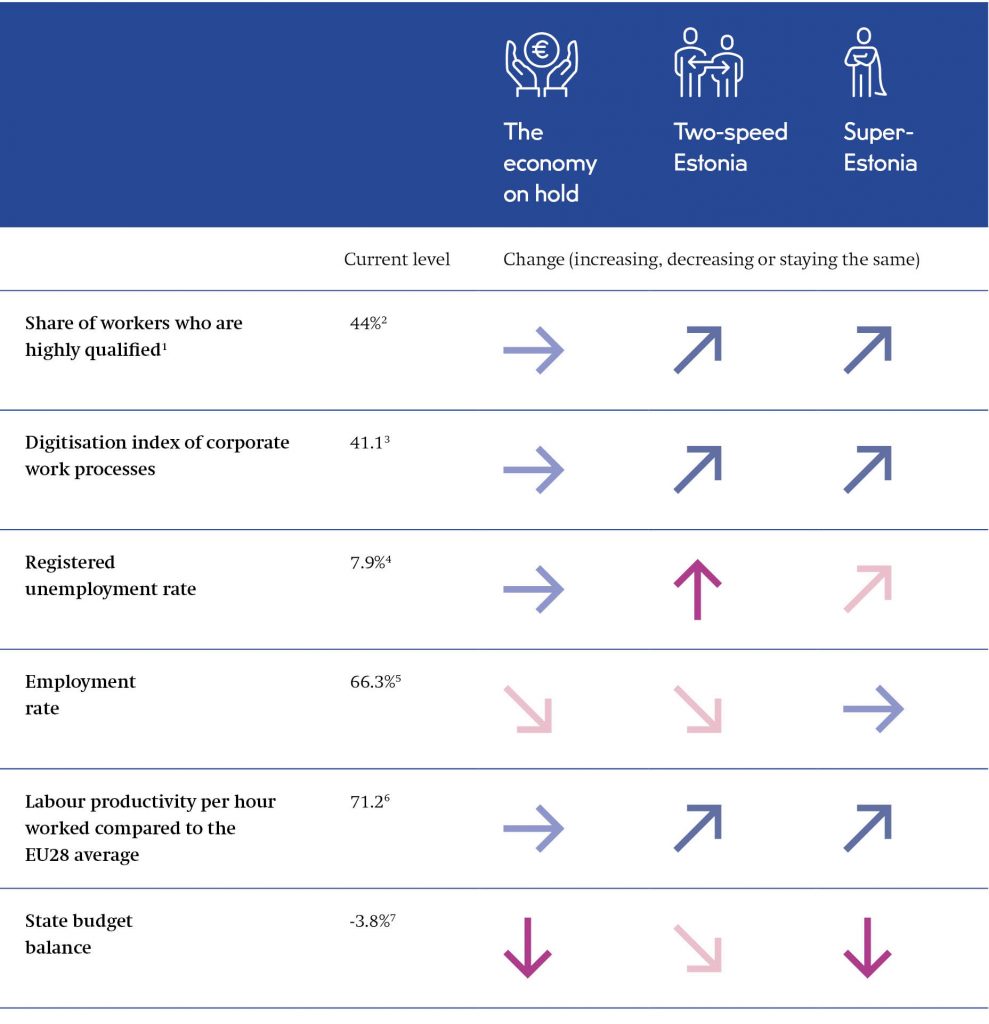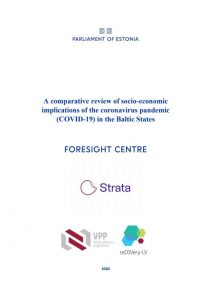The Impact of COVID-19

The research focused mostly on identifying the economic impact and future outlooks, including the possible changes in Estonia’s economic structure and competitive position compared to other countries. The possible progression of broader social and societal processes was viewed as the background. Keeping in mind the great number of uncertainties, we used scenarios to identify possible changes and considered the new opportunities as well as risks that these entail.
The virus crisis has compressed the development programmes of many businesses, as several years of development work have had to be done within a few months. Digitisation and automation of work and business processes has become a key point for survival. Virtual solutions have come to the fore.
The labour market is polarising faster than expected. Shortages of professionals are biting harder, while there is simultaneously an excess supply of medium and low-skilled labour. Openings for bringing in foreign
professionals need to be wider than they were before the crisis.
The coronavirus crisis has shaken up markets around the world as supply chains have been shortened and diversified. If Europe and Estonia act wisely under these circumstances, there is a lot to gain.
The crisis for the economy is a multilateral one: 1) people who are ill and in self-isolation cannot work or create value as they normally would, 2) the restrictions introduced to combat the virus are preventing the economy from functioning normally, and 3) the uncertainty caused by the crisis is affecting how people, companies and the government are behaving and will behave in future.
The sectors that have suffered most are those where the restrictions introduced against the virus have had most impact, which are accommodation, food service, travel, entertainment, and transport and storage. These sectors will play a more minor role in the economy for some time.
Sectors that are better proofed against the virus, notably information and communications, wood and paper production, and the financial sector, will increase in importance. Start-up companies will also benefit if the outlook is favourable, as there is a lot of money around the world searching for investment opportunities.
The virus crisis has accelerated several trends in the economy: 1) the creation of more resilient value chains and working processes, 2) digitisation and automation, and 3) increased use of remote working and virtual communications. Larger and stronger businesses will be able to manage those changes for themselves, but small enterprises and large companies in a weak position will be left in trouble. Rapid structural changes are taking place in the labour market as a result of these processes. The priorities agreed in Europe for relaunching the economy after the crisis will boost the Green Deal. Whether Estonian companies can remain competitive and become more so will also depend on these trends.
The crisis will widen the material and technological inequalities in society. New forms of inequality will arise, such as inequality in digital literacy and in the ability to work remotely.

The further course of the virus crisis and how it affects the economy and society may cause developments to move in quite different ways. By combining the main trends, we can produce three possible scenarios for what might come next:
- The economy on hold is where top priority is given to preserving existing companies and jobs and preventing social conflicts from worsening, and where the main support is given to large and strategically important companies so that growth in the economy can recover.
- Two-speed Estonia is where the main focus of economic policy falls on the capacity for spontaneous renewal from the crisis. Hope is placed in the appearance of new business models and an expansion of the hi-tech sector. Efforts are made to keep spending on social policy under control to avoid harming the business environment.
- Super-Estonia is where the crisis is used to spark a renewal of the economy, on the condition that the gains and losses are spread fairly across the layers of society, and agreement is reached in other areas where important decisions have to be made about the quality of life in Estonia, such as the use of natural resources. The priority is to upgrade the economy and infrastructure in line with the digital and green agendas of the European Union. Read more
The sectoral effects of COVID-19 were studied in cooperation with the OSKA (a system of labour market monitoring and future skills forecasting) research group of the Estonian Qualifications Authority.
Reports linked to the research
News linked to the research
-
09.01 2021The corona crisis made engineering industry develop original products
The cancellation of orders that was brought along with the first wave of the corona pandemic made companies in metal and engineering industries pay greater attention to developing original products, the report “The Impact of the Virus Crisis on the Estonian Economy. Scenarios up to 2030” by the Foresight Centre reveals. The shortage of suitable labour force and the risk-proofing of working processes has also compelled the industry to seek solutions for automating their activities.

 An independent think tank at the Riigikogu
An independent think tank at the Riigikogu 

